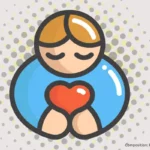
There are great days, days when you have a lot of energy, you feel happy and empowered and you could eat the world. There’re days less exciting – or frankly bad – in which the smallest task seems like a titanic effort. These are days when you feel like: “I don’t want to do anything”.
Although we usually think the way to touch the bottom psychologically is given by a deep depression or intense suffering, in reality there’re also other affective states that can be devastating snatching energy and motivation, leaving us without strength to face life and without wanting to do nothing. As the Japanese writer Haruki Murakami said: “Nothing is as cruel as the desolation of not wanting anything”.
Abulia: When I don’t want to do anything
The lack of desire is not laziness or fatigue. It’s a psychological situation in which you lose the ability to act because you think that setting goals and objectives in the short or long term doesn’t make sense.
In the most extreme cases you can reach abulia, which is an alteration of motivation and begins to manifest with problems to make decisions and put them into practice. The apathy is the lack of will or initiative and energy. It’s a kind of extreme apathy in which any activity will seem overwhelming and you lose interest in the things that once motivated and excited you.
Generally, apathy is accompanied by anhedonia, which is the loss of the ability to enjoy activities and find pleasure in life. When we suffer both problems, when apathy and anhedonia take root, it’s easy to fall into the black hole of depression.
However, without reaching the extreme cases of apathy, you can go through abull days, days when you don’t want to do anything. Why is happening this?
Why are there days when I don’t like to do anything?
1. Depletion, you’ve taken yourself to the limit
After an exhausting project, it’s normal that comes a period of extreme tiredness and apathy that can extend over several days or even weeks. When you’re immersed in a very demanding project, your body responds with eustress, a type of positive stress that helps you have extra energy. However, the eustress consumes physical and psychological energy, which in the end ends up taking your toll. That is why, when you finish the project and can finally relax, extreme exhaustion is likely to occur.
2. You neglected yourself, a lot and for a long time
Sometimes that exhaustion doesn’t come from a very demanding project but only from a demanding lifestyle in which you neglected yourself. If you run from one commitment to another, as if you were living in an eternal marathon, it’s clear that sooner or later your body and mind will stop because they need a break. In that case, the desire to do nothing could even be considered as a defense mechanism, an alert that you need to take a break and disconnect.
3. Vital boredom, you live in the Groundhog Day
It’s not typical boredom, but a state of vital boredom. If you don’t enjoy what you do every day, you don’t find the motivating tasks and you are not satisfied, it’s normal that you unconsciously refuse to start the day and respond to the prospect of a new day with apathy. If your days have become a copy of each other, you have many automated routines and you don’t know how to get out of that kind of “groundhog day” (the movie), you’re likely to sink into boredom and monotony, two feelings that take away the desire to do things. It’s enough to remember the phrase of Max Stirner: “The habit of renunciation freezes the ardor of desires”.
4. Frustration, you don’t see the light at the end of the tunnel
There are times when this desire to do nothing comes from frustration. If you feel stuck in a life you don’t like, but you don’t know how to escape from that situation, you’re likely to feel overwhelmed and frustrated. In fact, if you have tried to do things differently but – for some reason or another – it hasn’t worked, you’re likely to end up developing a kind of learned helplessness, which means that you have given up plunging into the most complete abulia . However, “Resignation is a daily suicide”, as Honoré de Balzac wrote.
5. Depression, plain and simple
There are times when this desire to do anything is the prelude to depression. Depression is accompanied by apathy, anhedonia and in a general sense of the loss of meaning of life. In some cases, depression is the result of a loss – of any kind – that leaves a huge void and generates a sense of emotional sterility. Other times it may be the result of an unresolved existential crisis in which is lost the meaning of life.
Finally, it’s important to be aware that this abulic state can also be the result of some physical problems, so it’s essential to go to the doctor to rule out a possible pathology. Hormonal variations, thyroid problems, anemia, diabetes and heart problems can lead to extreme tiredness and weakness.
How to recover the desire to do things? The power of surrender
When you don’t want to do anything, give up! It seems a contradiction, but you will discover that giving up is extremely liberating. Surrendering is not spending all day lying in bed, although if all you need is rest to recover strength it’s also an option, but assuming the state in which you are.
That surrender contains the seed of radical acceptance. It means stop thinking that you have to be doing things constantly. Stop pressing yourself for productivity. Embrace the tranquility and the dolce far niente. Don’t push or force yourself. Allow things to be the way they are.
The first result of that unconditional surrender is that you will begin to stop feeling bad about yourself. And that is a big step.
The second step is to find small things that become dynamizers of behavior and don’t require a great effort. A relaxing shower, listening to the music you like, making a gift… Anything is worth as long as you can experience more positive emotions that make you feel better.
It’s about taking advantage of that state of apathy in your favor to:
• Reconnect with yourself, with those things that you really like and that you have probably neglected for a long time
• Take some time to rest, giving yourself the permission to get out of the dizziness of everyday life
• Change the direction of your life – if necessary – to find new goals that are more motivating
At practical level, to recover the desire to do things you simply need to establish short-term objectives. Divide the activities into small tasks that you can manage better. That way you will be less burdened.
Focus only on the next step you should take. And when you finish it, give yourself a pat on the back. You deserve it! As you take small steps, you will also become empowered and that apathy will gradually disappear, just as it arrived.



